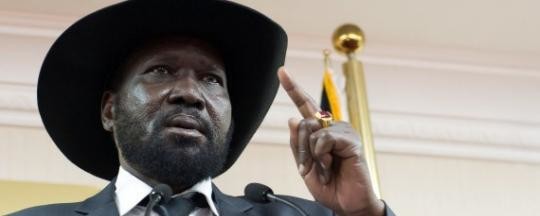The refusal of President Salva Kiir to sign a peace proposal at a highly anticipated signing ceremony in Ethiopia’s capital Addis Ababa on Monday prompted condemnation from his opponents and raised questions about why he rejected the proposal and what would happen next.
Supporters and critics alike reacted on social media. The spokesman of the Sudan People’s Liberation in Opposition, South Sudan’s main rebel group, which did sign the deal, warned that Kiir would go home to perpetrate more violence in the coming weeks.
He said on the online platform Twitter that Machar and Pagan Amum besides international bodies signed and endorsed the proposal but “Salva Kiir refused to sign.” He faulted Kiir and his ally Ugandan President Yoweri Museveni for an attitude that they can resolve the war by military means. “Kiir/M7 believe they can crush the resistance within the 15 days based on false belief of split [within SPLM-IO ranks],” he said. “The proof of the pudding is in eating it.”
James Gatdet Dak, spokesperson for Riek Machar, wrote on his Facebook page: ““SPLM/SPLA has decided to sign the peace agreement unilaterally in Addis Ababa if the regime of Salva Kiir refuses to sign the text which is worked out…Our Chairman, Dr. Riek Machar Teny-Dhurgon is now ready to sign it any minute from now…”
BBC Journalist Emmanuel Igunza was present in Addis Ababa. He tweeted about Machar giving a briefing quoting him as saying: “I signed this deal on my own free will and the conviction of our movement” and “I did not know that pres Kiir wan’t going to sign deal. I expected much more concessions from him”.
In the meantime, negotiators of several of the parties declined to immediately answer questions on the situation. However, according to one of the secretariat members from government delegation, the South Sudanese president requested for two weeks consultations in Juba. The request for a delay confirmed by other sources as well. Previously, IGAD had said it would not extend the 17 August deadline.
On the Twitter account of the Government of South Sudan, quotations supposedly from president Salva Kiir said, “If it is signed today (i.e., the peace agreement) and then tomorrow we go back to war, then what have we achieved?” and another one quoting “Peace that cannot be sustained cannot be signed.” Earlier that day on the same twitter account it was said the South Sudan government is optimistic.
Separately, a South Sudanese government official confirmed that there was no peace deal saying, “There is no agreement yet in the IGAD-PLUS peace talks.” “The government requested IGAD-PLUS to give fifteen more days for it to contact its constituencies and then give its view on the proposed… agreement.”
An independent observer, Crisis Group analyst Casie Copeland, said that the IGAD mediation formally announced the government has not signed and gave it 15 days for consultations. She said what was signed was “just an agreement the IO [Machar’s group] and FD [Former Detainees] signed and will be the basis for 15 days of consultations.”
Reactions on Facebook from civil society and citizens were mixed but there was no optimism as Andre van der Vlugt from PAX stressed: “South Sudan has a half signed peace deal, no reason for optimism yet.”
Blogger PaanLuel Wel wrote: “Junubeen wallahi; even the dead Cessation of Hostilities (CoH) agreement was more of a peace “agreement” than this unfolding mega-drama in Addis Ababa.”
Others questioned whom the president needs to consult in the ‘consultations’ that he requested. “Stolen. [He is] the president, whom does he need permission from?” said a South Sudanese working in Juba for a UN agency.
Others expressed their relief that Salva Kiir did not sign: “Welcome back to Juba in advance President Kiir and thanks for NOT signing IGAD plus proposal” mentioned Daniella Valentino Wol, an active supporter of the president on Facebook.
The people of South Sudan have to wait another 15 days to see if peace agreement will be signed on the government side as well. Akshaya Kumar from the Enough Project commented: “South Sudan people will wait 15 more days as gov’t ponder whether or not to sign. Plan B should be on all minds.” By ‘Plan B’ she meant sanctions that United States president Barack Obama announced he might impose on the warring parties.
Another commentator, David Deng of the South Sudan law society said, “Even in a best-case scenario, peace will never come from Addis Ababa. The most that these few leaders can do is agree to stop fighting long enough for South Sudanese to sit down — in South Sudan — and figure out how to live together without killing one another. Until there’s an appetite and demand for peace from the people, the conflict will continue.”
Edmund Yakani, head of a leading group of peace activists in Juba said on Radio Miraya, “In Peace there is always a bitter pill, we need to be ready to swallow the bitter pill, if the bitter pill can keep our country united and stable, lets swallow this bitter pill.”
(Updated 18 August)




